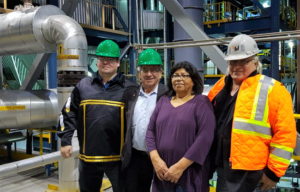Why a Northern sawmill and biomass power plant are key to the survival of Northern Ontario

As we reach the halfway point of Premier Ford’s mandate until the 2022 provincial election, Ontarians from across the political spectrum can agree that addressing the needs of Northern Ontario is critical – especially for a Premier who campaigned on standing up for Northern Ontario businesses and skilled workers.
Premier Ford’s mandate for supporting Northern Ontario’s economic development, namely in the forestry sector, is fleshed out in the 2018 Made-in-Ontario Environment Plan and the Draft Provincial Forestry Strategy. In both strategies, the Government commits to supporting local businesses that have innovative and sustainable forestry practices that both transition the industry toward a low-carbon future, and continue to provide viable, long-term career paths for Northern Ontarians. These strategies also highlight the need for meaningful First Nation participation and leadership in forestry. For example, applying the Indigenous Traditional Knowledge from millennia of First Nations stewardship unlocks innovative practices for environmental sustainability, like reforestation.
In January 2020, an announcement from the Ministry of Energy, Northern Development, and Mines to invest in northeast economic development demonstrates how supporting Northern businesses and encouraging Indigenous leadership go hand-in-hand.
A perfect example of the kind of business Premier Ford should recognize to deliver on his mandate is Hornepayne Lumber (a commercial sawmill) and Hornepayne Power (a grid-connected biomass cogeneration plant). Located just outside the Township of Hornepayne, Hornepayne operations are sustainably integrated: wood waste produced by the sawmill is used as the power plant’s source of biomass fuel to produce electricity, while excess heat from the plant is recycled to dry wood for product finishing at the sawmill. We also plant 2.5 million diverse species of trees to support a sustainable forestry sector that offers Northern Ontario’s skilled workers with a viable, long-term career path.
Hornepayne operations are a vital job centre for the Township, creating over 530 direct jobs and indirect jobs, like machine operators at the sawmill, power plant technicians, and truck drivers. While many other renewable energy generation projects rely on automation, Hornepayne has been the key to building up the local economy.
Hornepayne operations also invest in the community, contributing over $120,000 in voluntary support to the Township. With First Nations as our equity partners and shareholders, they receive direct revenue that they reinvest into our communities’ infrastructure, local economies, and create career pathways for Indigenous elders and youth.
Our investment in Hornepayne is a major lifeline for a community that has lost over a quarter of its population in the past 20 years, and we work closely with Hornepayne Mayor Cheryl Fort to retain and attract skilled workers and families.
When these operations became financially unviable in 2015 and 2016, the Township was devastated. In 2017, our three First Nations – Missanabie Cree, Chapleau Cree, and Netmizaaggamig Nishnaabeg (Pic Mobert) – worked with an entrepreneur to raise $4 million and restored Hornepayne operations, which was key to revitalizing the local economy.
Hornepayne’s energy contract expires in 2024. We ask Premier Ford and Minister Greg Rickford to recognize the vital impact that Hornepayne has on our community. It is a Made-in-Ontario model for First Nations leadership and a sustainable forestry sector, with room for growth. The time is now for this Government to show their support for Northern Ontario and keep our region open for business.
Signed,
Chief Keith Corston (Chapleau Cree First Nation), Chief Jason Gauthier (Missanabie Cree First Nation), and Chief Johanna Desmoulin (Netmizaaggamig Nishnaabeg)

